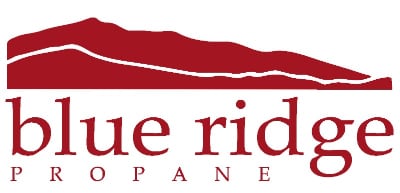Short Term Rentals - Click to read more..
2022-12-07
The High Country of North Carolina is one of the most beautiful places in the United States, during any of our four distinct beautiful seasons. Combined with the magnificent views, outdoor living and friendly locals we have seen a significant rise in popularity for visitors. Many seasonal homeowners have decided to tap into their vacant home potential and started utilizing their spaces as vacation and short term rentals. While this is a boost for the local economy, if not handled correctly, it can be a very expensive and potentially dangerous endeavor for the owner of a short term rental.
As a premier propane provider, whose primary focus is always SAFETY, we want to caution yourself and renters before tampering with any propane equipment. ALL propane equipment should be serviced by a licensed professional. The most common theme we see concerns gas logs.
GAS LOG appliances:
The actual logs should NEVER be moved from the configuration that the service technician placed them. Moving the logs can cause issues with ignition, sooting, and a general safety issue.
DO NOT use them like a wood fire. You cannot burn real wood on top of your gas logs, or melt marshmallows for s'mores, or any other cooking application.
DO NOT burn the logs 24/7 and never leave an open flame running if you (or renter) is not present.
Consider leaving an instruction sheet in the rental explaining how to utilize each appliance, and to contact you if there is any issue so that you can alert Blue Ridge Propane. We are not responsible for any damage that a renter sustains to your equipment. Another consideration would be automated home thermostats that can be controlled remotely, for climate control. Timers on gas logs are also effective at controlling usage. Please give us a call if you would like to have more information about any of these protective measures for your short term rental.
Cold Season Preparation - Click to read more..
2022-11-01
Before weather turns cold, it is a best practice to test all of your propane equipment before you actually need it. For heaters and gas logs, turn the pilot on. Make sure the pilot will stay lit when turning the gas valve to the ‘on’ position. You may also want to turn on any other type of heaters that utilize propane to make sure they start and power cycle. If you experience any problems, let your local propane provider know so that we may schedule a service call, before the weather gets cold. We experience very high call volume and service work requests during the month of October. When the weather cools off, and seasonal residents are traveling between homes, our service requests triple in volume. By testing your equipment early, you can avoid the wait during our peak times.
Also check your tank propane levels by utilizing the gauge on top of your tank. This is a convenient way to see how much propane you have available. The gauge measures the percentage of propane left in your tank. For example, if the needle is pointing to “80”, this means your tank is completely full. Tanks aren’t filled to 100% because we have to leave room for the liquid and vapor to expand and contract with the changes in the outside temperature. If you notice your tank is down to 20% and you haven’t received a delivery yet, you may call our office to have a delivery dispatched. However, most of our customers are on a “keep full” basis, and we will stop by monthly in our regular route to top off your tank in the winter months. Then, not as often in the summer. We also keep on record all of the propane appliances in your home, and how may BTU each of them are; so that we are aware of what your average usage should be. That is why we set the size tank you need; and know that it should be plenty of capacity until we are able to run our monthly routes.
In addition to your tank level, check for a clear path to your propane tank. It needs to be free of any overhanging tree limbs, overgrown bushes, or other yard debris. Our drivers need a safe path to travel from the truck, while pulling a hose, to your tank. When snow is on the ground, drivers may not be able to see all the way to the ground and may become entangled in debris that is under the snow. This would prevent us from making a safe delivery; and our main goal is SAFETY. Safety for our drivers and equipment, and also for yourself and your property.
10 Things You Can Do To Keep Your Family Safe During Winter Storms - Click to read more..
2022-08-11
Taking these 10 simple steps can help promote safety all season long. With a little advance planning, you and your family can be prepared for severe weather events such as winter storms. For additional information on preparing for winter storms and other severe weather conditions and natural disasters, contact your propane supplier or visit Propane.com/Safety.
Make sure you have an adequate propane supply. Discuss with your propane supplier the possibility of scheduling regular winter visits so that you always have an adequate supply of propane in your tank. This will avoid running empty in times of heavy snowfall when roads may be inaccessible for delivery.
Mark the location of your tank with a flag, pole, or stake that is higher than the average snow cover depth for your location. Contact your local weather bureau if you need data for your area. If you already have markers, make sure they are planted firmly and highly visible. These markers will help you avoid plowing or shoveling rooftop snow on top of your tank. Should your tank become covered with snow, use a broom to clear it.
Make sure your heating system and appliances are running efficiently. Before the start of each heating season, have a qualified service technician inspect and service your appliances and propane system. This will ensure that your appliances are running as efficiently as possible, conserving fuel and saving dollars.
Create an emergency preparedness plan and review it with everyone in your family. Post a list with contact information for your propane supplier and emergency services (fire department, etc.) along with instructions for turning off propane, electricity, and water. If you do need to turn off your propane, contact a service technician to inspect your propane system prior to turning it back on.
Prepare a family disaster supply kit with several days’ worth of water and canned foods along with a can opener, extra clothes and blankets, flashlights, and batteries. Include a battery-powered NOAA weather radio so you can stay informed as conditions change. Make sure to keep rock salt, firewood, and snow-removal equipment accessible from inside.
Check your chimneys, flue pipes, vent connectors, and propane tank for damage, blockage, or debris caused by snow and ice. Use a broom rather than a shovel, and clear these areas frequently. This will help reduce the possibility of carbon monoxide (CO) poisoning due to blocked or damaged chimneys, flues, and vents.
Consider installing UL-listed propane gas detectors and CO detectors. These detectors provide you with an additional measure of security. Be sure to follow the manufacturer’s instructions regarding installation, location, and maintenance.
After the storm passes and it is safe to do so, check the entire area for downed power lines, damaged gas lines, or damage to your propane tank. Immediately call your local utility company or propane supplier if any of these hazards exist. Do not attempt repairs yourself. Proper ventilation is necessary for their safe operation, and CO fumes emitted can be lethal. Only use appliances indoors that are designed and approved for indoor use.
Never store, place, or use a propane cylinder indoors or in enclosed areas, particularly in the event of a power outage. Proper ventilation is necessary for their safe operation, and CO fumes emitted can be lethal. Only use appliances indoors that are designed and approved for indoor use.
Exercise sound judgment. As with any challenging situation, your composure during winter storms will ensure you don’t take unnecessary risks or pose any additional dangers to your family and home. Stay calm; use radios, television, and telephones to stay informed and connected. Remember, winter storms can last several days and roads may be inaccessible for fuel delivery. Conserve fuel by keeping thermostats down to 65° during the day and 55° at night, and close off any rooms that don’t need to be heated. If any questions arise, contact Blue Ridge Propane or your local fire department.
Flood Waters - Propane Safety Tips - Click to read more..
2022-07-16
With the potential of heavy rains bringing dangerous flooding to parts of Avery County and surrounding areas during the summer and fall season, it’s critically important to take actions to help keep your family and home safe and secure. Residents with propane on their property will be well served by taking a few specific precautions. So, whether you’re preparing for floodwaters to reach your property or already waiting for waters to recede, the following safety measures can be implemented to help protect your family and your propane home before, during, and after the flood.
Create an emergency preparedness plan and review it with everyone in your family. In addition to listing contact information for emergency services and your propane supplier, make sure to include instructions on how to turn off electricity and water, and how to shut off the outdoor propane supply and indoor propane appliances. If you have time, consider installing a carbon monoxide (CO) detector on every level of your home, as well as installing one or more propane gas detectors. Make sure you and your family know what propane smells like. Propane has a strong, unpleasant smell like rotten eggs, a skunk’s spray, or a dead animal. Blue Ridge Propane supplies a brochure to all new customers initially, and all customers annually that has a scratch and sniff button that demonstrates this smell.
In flood zone areas, make sure your above-ground and underground propane tanks are anchored securely. This will help prevent tanks from moving from their secured placement on the property if the water level rises.
In the event that a flood threatens your safety, shut off the gas. During a major flood, you may have to decide whether or not is necessary to evacuate. Listen to local authorities for instructions on the appropriate course of action to take. Whether it is determined that you should stay or leave, shut off your gas. First, close the valve to the right (clockwise) to turn off the main gas supply on your propane tank if it is safe to do so. Then, turn off the gas supply valves located near individual indoor appliances. Consult your propane supplier to make sure you know where the actual valves are located and how to shut them off. If you do evacuate, use caution when returning to your home, farm, or business, and leave the area immediately if you have any doubts about your safety. If it is dark, use flashlights, not candles. Check for downed power lines and shifted or damaged gas lines or tanks. Immediately call your local utility company or propane supplier if any of these hazards exist. If you find a propane tank on your property that is not yours, or if your propane tank has become dislodged or is missing, contact Blue Ridge Propane or local fire department immediately.
If your home or business is without heat or power, never use outdoor propane appliances indoors or in enclosed areas. This includes outdoor portable heaters, barbecue grills, and portable generators. It’s also important that you never use a gas oven or range-top burner to provide space heating, and never store or place a propane cylinder indoors or in an enclosed area.
Schedule a time for a qualified service technician to perform a complete inspection of your propane system. This will ensure your safety if you suspect any of your propane appliances, equipment, or vehicles have been under water or they have been damaged (or you have turned off your gas supply ahead of a flood). Do not use or operate appliances, equipment, or vehicles, or turn on the gas supply, until your system has been inspected by a qualified service technician. Do not ever turn on a light switch, use any power source, or inspect your household appliances while standing in water. Do not under any circumstances try to modify or repair valves, regulators, or other appliance parts.
Exercise sound judgment. Stay calm; we’ll get through this as a community together. Use radio, television, and telephones to stay informed and connected. If any questions arise, contact Blue Ridge Propane or emergency services. These safety tips can go a long way to maintaining a level of safety while the any area waits for the flood waters to recede. For additional information on protecting your propane home visit Propane.com/Floods. Blue Ridge Propane can be reached 24 hours a day by calling 828-733-3603.
(adapted from Emergency Flood Procedures by the National Propane Council)
Propane Tank Placement - Click to read more..
2022-06-22
In the mountains, we are used to rugged terrain and cold temperatures. When it comes to the placement of your propane tank, our service technicians always find the best place in compliance with North Carolina Gas Code, ease of filling for the driver, and also the most pleasant visually to the homeowner. For larger tanks, our preferred method of tank placement is underground. Sometimes, terrain and other conditions prevent tank burial and we must place above ground. In many scenarios, builders and homeowners want tanks in hidden locations out of line of sight. This may not always be the safest place for a tank (over an embankment, down a steep set of stairs, etc.) especially when it comes to the driver delivering propane to the tank in the colder winter months. Not only does the driver have to navigate less than favorable conditions, including inclement weather and cold temperatures, we can’t have a safety risk to our drivers while trying to fill tanks. This also means do not build an enclosure around your tank which prevents easy access. If a tank is inaccessible, we will contact you and you won’t receive a delivery until other arrangements are made. This includes and isn’t limited to, proper driveway maintenance, keeping trees and limbs cut to accommodate the size of a tank delivery truck, making sure bridges are secure, etc. Let our certified, experienced and trained technicians make the final call on your tank placement at your permanent or secondary home. They will always make the most informed choice. As a reminder, never try to disconnect or move your tank. That is also a job for the experts here at Blue Ridge Propane.
Delivery Frequency - Click to read more..
2022-05-19
At Blue Ridge Propane, we keep all of our customers on a “keep full” basis. This means that every time our truck runs the designated route near your home, your tank will be topped off automatically. In the winter months, we deliver monthly; then as the weather outside gradually warms, we don’t come by and fill as often since most customers aren’t utilizing their propane appliances with as much frequency. Fall fill ups begin in August/September of each year leading us back into the regular, monthly winter delivery schedule. For our clients that utilize propane for daily tasks, such as water heaters and clothes dryers, we have this information on file, and can easily identify the customers who will need additional warm weather/summer deliveries. We can also look at your past history to determine if you are on track with your typical usage. Below are some important dates on the Blue Ridge Propane calendar that you can use for future reference.
January – Primary Focus is Propane Deliveries, Emergency Service Work
February – Propane Deliveries, Scheduled Service Work
March – Propane Deliveries, Scheduled Service Work
April – Propane Deliveries, Scheduled Large Commercial Customer Maintenance (seasonal kitchens, etc)
May – Minimum Annual Requirements – Deliveries to clients that typically only have one delivery a year to determine if they have met their minimum for the year. One of the highest volume months for service work
June – Limited Propane Deliveries; Major Service Work; Set new tanks
July – Limited Propane Deliveries; Major Service Work; Set new tanks
August – Price is set for PreBuy Customers; Beginning of Fall Fillups; Continuing service work; Beginning of Budget Payments for Budget Customers
September – Fall Fillups, Continuing service work
October – Seasonal Resident ‘close up’ services; continuing propane deliveries. One of the highest volume months for service work.
November/December – Primary Focus is Propane Deliveries, Emergency Service Work
The Importance of a Converstion Kit - Click to read more..
2022-04-25
What is a conversion kit and why do I need one? The simple answer is that most appliances such as dryers, ranges, cooktops and furnaces are made for use with natural gas. Other appliances such as gas logs, heaters, water heaters, and generators are made specifically to be utilize with propane or natural gas; and must be specified at the time of order.
Dryers, ranges and cooktops require a conversion kit to be operated safely with propane. The natural gas orifice that is present in these appliances must be sized down so that the flow of gas isn’t as much. If these appliances aren’t converted, it can cause the flow of gas to be too strong and be unsafe to use. If there is a very high flame present on your cooktop or range, and your pots are getting sooted by the flame, it is possible that a conversion kit may need to be installed by a professional.
When these appliances are ordered, the customer must ask for a conversion kit that is specific to the make of the particular appliance. Not all kits are universal, and are specific to the manufacturer and appliance. Always make sure when installing any new appliance, that a licensed professional must be the person to complete the installation; even if it is switching out a current one to a new one.
We are always ready to answer your questions. Also see our blog post about the difference in propane and natural gas for further product education.
What is the Price of Propane - Click to read more..
2022-03-25
This is a common customer question that is asked daily, in the summer months and winter months alike. There are more factors than just one that comprise the actual price of propane per gallon.
Propane is a commodity that is refined from other commodities and is traded on a worldwide market. Due to the nature of commodities, many factors can cause prices to fluctuate like we are seeing today. Seasonal demand, climate change, exports, unforeseen economic and political factors, weather, pipelines, employee availability, etc. These are factors that are beyond any local supplier’s control, but we can still manage our own internal factors to a certain degree.
Locally, our state and federal government provides codes and guidelines that must be adhered to at all times. We not only have to pay for the propane that we bring to your home or business, we also have equipment to maintain, fuel for our delivery/service vehicles and employees to pay (and associated taxes). Other factors of doing business in this highly regulated industry include every type of insurance we must carry, employee continuing education, safety audits, OSHA compliance, hazardous materials reporting and compliance training.
Shopping around for a cheaper price per gallon between propane companies is not always the correct path for customers to take; in hopes of saving a few cents per gallon. Most companies have a way of tracking usage. Switching companies takes all of that data and makes you start from square one, therefore not having your history to compare and forecast future deliveries. Cheapest price doesn’t always mean the best service or the safest practices. Having a good working relationship with your provider is priceless; knowing you can count on your local neighbors for timely deliveries and quality service work, especially when times get tough.
Rental Policy - Click to read more..
2022-03-01
As one of the most sought after areas in the United States, the High Country has experience exponential growth since the beginning of the pandemic. We are seeing record numbers of tourists, influx of full- time residents, and part time residents spending more time here than ever. Many homes are second homes, and what has been vacant in years past is now being handled by professional rental management companies as well as websites such as VRBO and AirB&B.
If you find yourself in one of the above scenarios with your property, it is prudent to let your propane company know. When people change the habits of their home, your provider needs to know so that they can ensure prompt deliveries, and minimizing out of gas situations. Renters typically keep heat on higher settings because they aren’t used to the cold temperatures in the mountains. Also, they engage in many outdoor activities and like to come back to warm surroundings. Therefore, we have statistically seen usage higher at any rental property; short or long term.
Short Term Rental Policy – Propane is delivered regularly and home owner is responsible for payment of bills. Homeowner is also responsible for any repairs and/or service work that needs to be performed on any of the heating appliances in the home.
Long Term Rental Policy – Renters must prepay for their propane or keep a credit card on file for automatic payment for any deliveries. It is the renter’s responsibility to call and order propane. We need to be called before the tank falls below 20% so that we have time to schedule a delivery; instead of dispatching an emergency delivery where additional fees will be assessed.
If you have specific questions concerning your rental property, please call our office at your earliest convenience or fill out a request in the “Contact Us” section of this website. We would also welcome a phone call Monday – Friday, 7:30 am- 4:00 pm at 828-733-3603.
Help Us Help You - Click to read more..
2022-02-09
During the winter months, the call volume in our office almost triples. One of our key advantages above our competitors is that every time you call our office, you get to speak with a real person who is concerned about helping you. We can take payments over the phone, take requests for propane deliveries and service work. Since we are experiencing such a high call volume, we ask that you Help us to Help You.
Have your name and service address ready to give to the customer service team.
We don’t need a history of the home, when you purchased it, or how long you have been a customer. Several pieces of key information are needed so that we can look up your account when you call in; the first and foremost your name and service address.
If you are calling in to make a payment, have your payment information ready.
We accept credit/debit cards as well as banking information for payments. Have these items ready before calling in so that you don’t have to look for them while customer service is on hold.
When requesting a delivery, make sure your driveway is clear of snow/ice/other cars, etc.
Drivers must have access to your propane tank that is the least path of resistance. It is not a safe practice to place a driver, our equipment, or your property in an unsafe situation.
Let us know at the time of your call what your gauge reading is. Tanks have a gauge located under the dome which will tell you how much % is remaining.
Our service area encompasses nearly 5000 full and part time residents. When calling in, unless it is an emergency, realize that we may have to schedule your request for a later date. Same day appointments are reserved for emergencies and are subject to availability. We work our customers in quickly, and prioritize according to their specific needs.
We stand ready to help you at any time; and offer 24 hour emergency services. Be sure to have as many details as possible so that we may help you more quickly and efficiently.
Keep Driveways Clear for Propane Deliveries - Click to read more..
2022-01-28
During the coldest months of winter, we all know that the High Country has snow storms and extended periods of freezing temperatures. Our primary goal in winter months is propane delivery. We want to make sure all of our customers have enough propane to last between deliveries. Sometimes, ice and snow can make this a challenge. Our drivers not only have to navigate the cold weather, but also the safest route between stops to ensure safe, effective delivery of product. If your driveway is snow covered, or impassable with a passenger vehicle, we are unable to send a propane truck to your home for delivery. We will not place our customers, employees or equipment in harms way. Safety is always in the forefront of our minds, in winter months or warmer weather. Please help us help you by keeping your driveways cleared, as well as pathways from where our truck parks in your driveway to the tank itself. Also, when clearing snow, make sure that tanks are not buried underneath mounds of snow and ice. These conditions make it virtually impossible to make a delivery. Beware of any other obstacles that drivers may have to overcome to make a safe delivery. When requesting service or delivery, make sure that you alert our office staff of the condition of your road (secondary roads, neighborhood roads) and especially your driveway. Thank you for taking a proactive approach to ensuring a successful delivery so that you and your family stay warm this winter season.
Winter Workflow - Click to read more..
2021-12-29
When the weather gets colder, it is easy to think “I NEED HEAT FOR THE WINTER”. However, WINTER IS TOO LATE to be thinking about your heating needs. If you are considering adding an appliance or starting new service, these things should be done in the SPRING and SUMMER months. In the winter months during cold weather our PRIMARY focus is propane delivery. We are always glad to accommodate our customer’s needs, whether it be for service work or propane deliveries. WINTER is a very busy season for any propane company, and it is more difficult to accommodate NEW installations during this time. Another factor to consider is that our company services all types of residences and commercial properties; both local and seasonal. Be considerate when requesting service to know that we take each customer request seriously, and prioritize them accordingly.
We appreciate your business, no matter what time of year. Each customer is treated with respect; and we are grateful for the opportunity to provide propane deliveries and service.
Why Can’t another propane company fill the tank at my house? - Click to read more..
2021-12-10
State law prohibits one company from filling a tank belonging to another company; with sound reasoning. The company that has their tank at your house deserves a return on that investment, and their margin on the propane they sell you is a large part of that return. They may also charge rent on the tank if you do not buy a prescribed amount of propane each year. At Blue Ridge Propane, we charge a minimum annual requirement. For instance, the size tank that you have; we ask that you purchase a certain dollar amount of propane annually, in the time period that runs from June 1 through the following May 31. Most propane companies charge a monthly tank rent regardless of how much customers utilize annually. Customers do not have the right to ask another company to fill that tank, no matter how much less they charge. You may shop around for the best price if you own the tank yourself, and that is the return you get for your investment of buying a tank.
Buried Propane Tanks - Click to read more..
2021-11-14
“My tank is buried, how long will it last?”. This is a great question that we are glad to answer.
For tanks that are buried with no protective coating or sacrificial anode, they can be subject to rust and corrosion. This is because of chemical reactions that occur because of voltage differences between steel surfaces and various substances in the soil. This corrosion can happen in mountain soil particularly, or in areas with high concentrations of moisture, rocks, salts, and fertilizer.
For all underground tanks, we install an ‘anode’ that offers cathodic protection to your tank, so that the soil doesn’t corrode the steel of the tank. There is also a special external coating on the tank that uses an epoxy powder paint. The special coating protects the tank in tandem with the anode. By utilizing both of these methods, tanks can stay in the ground for literally decades.
Anode bags are made of magnesium, which has a very low electrode potential. This helps dilute any voltage in the ground and stops the current coming from external sources. The technique controls the corrosion of a metal surface by making the metal in the ground the cathode by installing an anode next to it. When the two metals are connected there is a difference in current flow which prevents corrosion. The sacrificial anode then corrodes instead of the protected metal.
All new installations are completed with this added layer of cathodic protection. If you have any questions about your tank, call us at 828-733-3603 with any questions.
Direct Vent FirePlaces - Click to read more..
2021-10-26
A realistic looking, warmth producing propane appliance that you may consider adding in your home is a direct vent fireplace. These units are different from gas logs, in the fact that it is an entire unit with a glass (typically) front that allows you all the aesthetics of a real wood burning fire. The units are often decorative and provide a warm, homey feeling in any setting.
The main difference that separates these units from traditional gas logs is the dual air chamber within the flue of the unit. See the diagram below about the internal workings of this type of unit.
Combustion air is drawn from outside the building.
Cool room air is pulled into the lower chamber; it will circulate around the firebox and is released into the room as warm air via the fan. The heat from the central burner also emits more radiant heat from the face of the unit, into your living space.
The Terminal is mounted outside, connecting to the fireplace indoors.
Venting exits from the top or rear of the fireplace to allow more versatility for installation.
Optional rear exhaust.
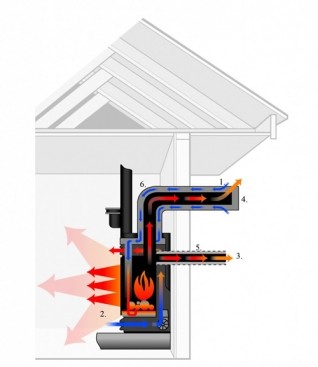
If you think that this type of unit is something that you would like to investigate further, view the links for Napolean and Majestic under our Products tab.
Help! My Pilot Light Went Out on Gas Logs! - Click to read more..
2021-09-20
Oh no! My pilot light went out for no reason on my gas log set! Never fear, these units are designed with one or two safeties that stop the flow of gas one the pilot goes out. You may also turn the gas valve to the OFF position. This will ensure all the flow of propane is stopped from the unit.
To relight follow these simple steps:
Turn gas valve to the PILOT position. (indicator will be lined up with the word PILOT on the gas valve)
Depress the gas valve (press in) and hold while using the ignitor to lite the pilot. A grill lighter can also be used to light the pilot.
After the pilot is lit, keep holding in the gas valve button for at least 30 seconds to get the thermocouple to warm up.
Turn the gas valve until the indicator is in the “ON” position.
This will turn your logs on, and can be utilized with an on/off remote or any other switch that your particular model has.
If a remote is installed, make sure the battery (ies) in both the remote and receiver (black box inside fireplace that remote talks to) have been changed.
Make sure the receiver toggle switch is in the remote position for the remote to turn the logs on and off.
2nd Year Best of the Best in Avery County Award - Click to read more..
2021-08-18
We at Blue Ridge Propane pride ourselves in being a local family-owned business since 1992. Our philosophy has always been to treat customers how we would like to be treated. Serving both the local and seasonal communities is something we take great care and safety for each individual customer. All of our technicians and drivers are certified in the tasks they undertake. In addition to fuel piping certification, hazmat training and having commercial driver’s license, our team has monthly safety training updates as well. The safety training is attended by all employees; both office and field personnel. It is our goal to have a knowledgeable and trained staff to help you with any and all of your propane needs. When calling our office, be prepared to give the service address of your property. This way, we can locate you quickly and efficiently; and help you with any questions or service requests. As a second year recipient of the Best of the Best Award from readers of the Avery Journal, we want to thank all of our customers for your business.
Propane Furnace vs. Heat Pump - Click to read more..
2021-07-28
In climates where heating is a primary concern from the months of October through April, all homeowners must decide what their main source of heat will be. There are pros and cons to each type of heat source, however, the colder the temperatures, the more efficient a propane system is compared to electric.
Heat Pumps are generally a dual fuel system. They utilize electricity as their primary form of power. After the temperature gets below freezing, electricity doesn’t heat as efficiently as propane. The propane portion of the heat pump then begins to be utilized and the primary form of power is then propane. Most heat pumps blow air that comes out of the vents at about 95 degrees, which is colder than normal body temperature. This is because a heat pump isn’t generating / creating heat, it is only transferring heated air, or ‘pumping it’ into your house. However, a heat pump can also provide air conditioning in the summer months by reversing the flow of refrigerant to then cool the air being pumped into your home.
Propane furnaces actually create heat instead of just heating air. They utilize multi stage burners and variable speed motors to deliver heat that is approximately 120 degrees coming through vents/registers. They are also efficient in the fact that they produce low carbon emissions when compared to other heating fuels/systems. For larger homes, a propane furnace is more efficient, especially when temperatures drop below freezing.
It is the responsibility of a professional installer to recommend the correct size and type unit for your home heating needs. Blue Ridge Propane can recommend installers who can also service your heat pump or propane furnace.
Benefits of Propane Appliances - Click to read more..
2021-07-01
Whether it’s time to replace an aging appliance or add something new, you need to consider upgrading to the performance of propane. Our company is a good resource to learn about all the ways propane can give your family the comfort they deserve, and the efficiency you’re looking for. Not only will you enjoy reliable comfort, better savings on electric utility bills but also sustainable living.
Don’t stop with just a propane water heater or furnace. Once you’ve included propane for one appliance, it’s easy to add propane kitchen appliances, clothes dryers, fireplaces, backup power, and more. Nearly any gas appliance can be converted to run on propane. And when you include more propane appliances in your plans, you can count on outstanding performance and even greater energy efficiency.
Blue Ridge Propane can assist you with ensuring your replacement appliances are properly installed, or getting propane to your new appliances. They’ll also work with plumbers, HVAC pros, or other construction professionals during the install. It is always best for propane professionals to install or repair any propane appliance.
Tank Ownership - Click to read more..
2021-05-28
In the state of North Carolina, the company that provides service to your tank is usually the owner of your tank. This is why other service providers are not allowed to fill your tank. The only way that another service provider is allowed to fill your tank is if YOU are the owner of your tank. In this case, you must provide legal documentation and a bill of sale for your tank to the provider from which you would like to receive service. If the previous owner of your home states that they own the propane tank when you purchased the home, they must be able to provide this same documentation to you as the new owner, and keep with other important documentation about the home. It is a typical misconception that when a home is newly purchased, the propane tank comes along with the deal. This is not the case unless the tank ownership documentation is conveyed in the actual purchase. When a new owner transfers their service from the old owner, the lease agreement for the tank is also transferred; not ownership. All customers of Blue Ridge Propane must sign a lease agreement stating they understand that the tank on their real property belongs to Blue Ridge Propane, unless otherwise stated. If you have questions about your tank ownership, we are always glad to provide the proper documentation. Only about 10% of all propane tanks are customer owned.
National Terroism Advisory System Bulletin - Click to read more..
2021-05-26
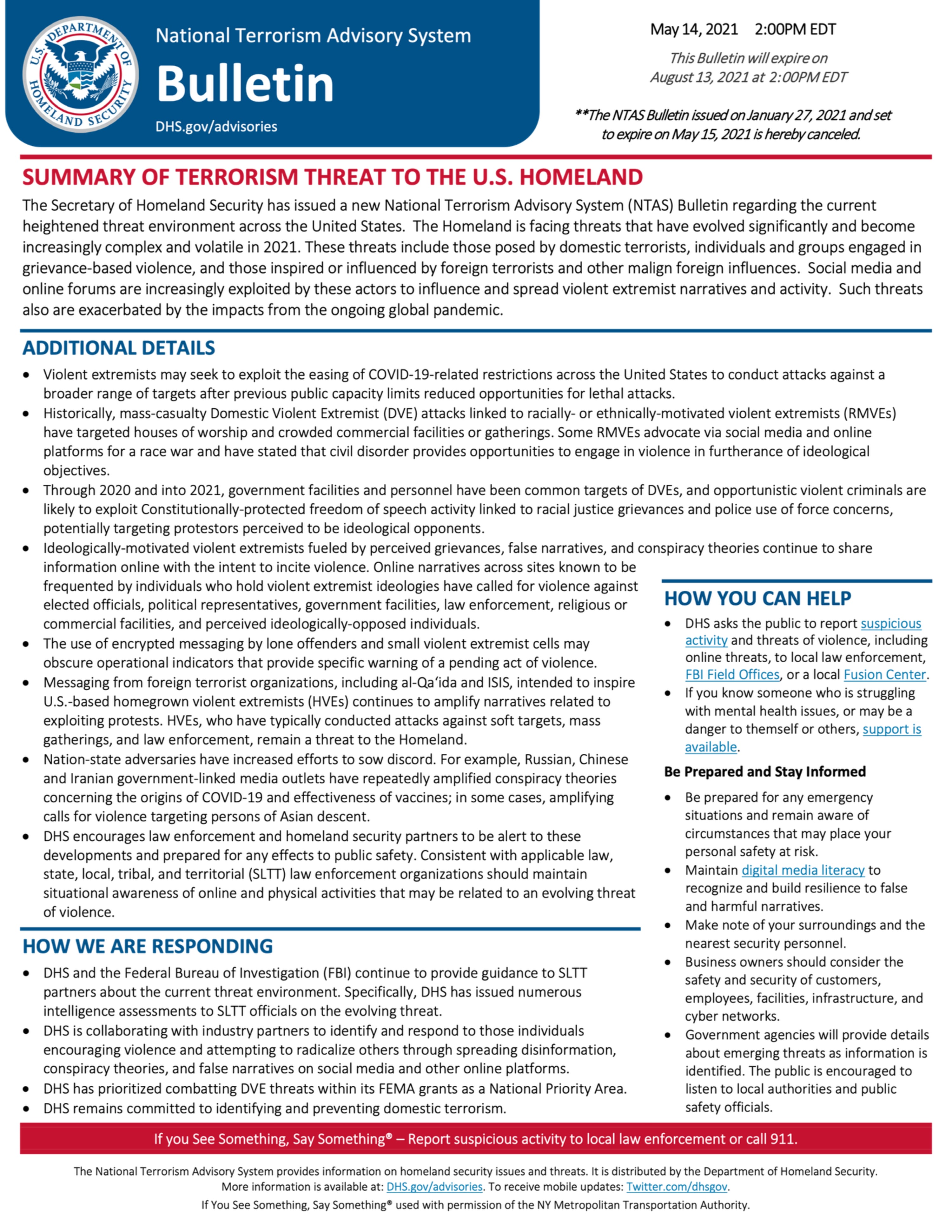
Colonial Pipeline - Click to read more..
2021-05-14
Friday May 7, 2021 – After a cyberattack on the network handling operations for the Colonial Pipeline, a temporary shutdown of operations has been issued. This particular pipeline supplies fuel from refineries on the Gulf Cost to the eastern and southern United States through 5,500 miles of pipelines. Their operation supplies approximately 45% of the East Coast fuel supply.
Statements from Colonial Pipeline verify that ransomware was used in the cyberattack. They had to take some of their systems offline to contain the threat, which has in turn temporarily shut down all operations.
“At this time, our primary focus is the safe and efficient restoration of our service and our efforts to return to normal operation," the company said Saturday. "This process is already underway, and we are working diligently to address this matter and to minimize disruption to our customers and those who rely on Colonial Pipeline."
Cybersecurity is a major concern for any business; large or small. This is something that Blue Ridge Propane takes very seriously. Our customers have access to bill pay online, and we have many security protocols in place to ensure the safety of their information. Our privacy practices can be viewed here. http://www.blueridgepropanenc.net/billPay We use encryption of payment data over a secure server. The use of a cloud server for information is in effect.
Safety Information Mailing - Click to read more..
2021-04-23
In May of each year, all of our customers receive a mailing from Blue Ridge Propane addressing propane safety. This brochure outlines what propane smells like, how to turn your tank off in case of an emergency, and also how to get in touch with Blue Ridge Propane. We send out this information to each customer both at the time they sign up as a customer and annually in May. For our customers that keep an email address on file for your billing, make sure you also keep your MAILING address updated so that you can receive this important information each year. You may use the contact portion of this website to update your information or call our office during regular business hours Monday – Friday, 7:30 am – 4:00 pm at 828-733-3603.
Mountain Electric Planned Outage - Click to read more..
2021-04-15
***PLANNED OUTAGE POSTPONED UNTIL MAY 1st, 2021***
AVERY COUNTY, NC SERVICE AREA
PLANNED OUTAGE SCHEDULED
FOR MAY 1, 2021
The planned outage originally scheduled for April 17th has to be postponed until May 1, 2021 due circumstances beyond MEC’s control. We apologize for this change. The areas affected will not change.
Mountain Electric Cooperative has a planned major power outage scheduled for Saturday night, May 1, 2021 in the Avery County, NC service area. This outage is necessary to shift the current load from the aged Cranberry Substation to a temporary substation for the purpose of refurbishing the current substation in a safe manner. The temporary substation will serve the load for several months during the refurbishment. Once completed (late October), the load will be shifted back to the permanent substation. These outages are not desirable; however, they are necessary to improve the reliability of the electrical system. The following areas will be without electricity beginning at 11:00 PM; Elk River Estates, Heaton Community, Hickory Nut Gap Road, Matney community and portions of Banner Elk. The following areas will be without power beginning at midnight; Newland, Cranberry, Minneapolis, Sugar Mountain, Grandfather, Montezuma, Linville, Pineola, Crossnore, Jonas Ridge, Old Beech Mountain, Blevins Creek, and Linville Falls. Please note that the outage will NOT affect portions of Banner Elk, Beech Mountain, and Elk Park. Work should be completed by 8:00 AM on Sunday morning. Contact 828-733-0159 with questions. Please share this post to help get the news out to all the affected members.
Preparing for Outdoor Grilling - Click to read more..
2021-03-12
Now that the weather is starting to get warmer, it is time to start thinking about cooking outdoors and using your propane grill or flat top. If tanks have been sitting all winter, it is a smart idea to check the tank and the grill for leaks before preparing a meal. Take a few minutes and go over these quick steps to ensure the safety of yourself and your property.
Turn off all grill knobs and make sure valve is all the way closed on your propane tank. All testing needs to be done in a well-ventilated outdoor area, not in a garage, carport or basement. DO NOT smoke while testing equipment, and stay away from any sources of ignition, open flames or sparks.
Mix a bottle of 90% water and 10% dish washing liquid. Mix until combined in a bottle that has a spray nozzle attachment.
Turn the valve to the ON position on the propane tank
Turn the valve to the ON position on the propane tank.Spray the soap solution onto the regulator, gas valve and grill hose. Spray any seams in the metal which may include at the collar, or around the middle of the tank. Step back and make a visual inspection of all the places where you sprayed the soap solution. Soap bubbles will instantly form and grow if there are any leaks present. If you see bubbles, turn the tank off immediately. A leaking tank should NEVER be used for any application, and should be turned in to the nearest propane supplier.
For any grill parts that look rusty or unfit in any way for use, consult your manufacturer’s user manual for specific instructions pertaining to each grill unit.
If your grill, flattop or other outdoor propane equipment is hooked directly to your large whole home propane tank (and not a portable cylinder), call our office to have a service technician test your equipment before utilizing. We are available Monday – Friday, from 7:30 am – 4:00 pm at 828-733-3603 to schedule appointments.
Conserving Heat in Cold Weather - Click to read more..
2021-02-02
A common question that we have heard from our customers lately is “Why am I using so much propane this year”. That is a question that is multifaceted, and to understand its deep reaching roots means comparing several items. By considering each of these points, you can better understand your propane consumption.
The winter of 2020-2021 has been colder than in previous years. Most local weather outlets have an almanac section that you can easily toggle between months and years to see daily average temperatures. Also, we have had a larger percentage of precipitation in the form of snow than in previous years.
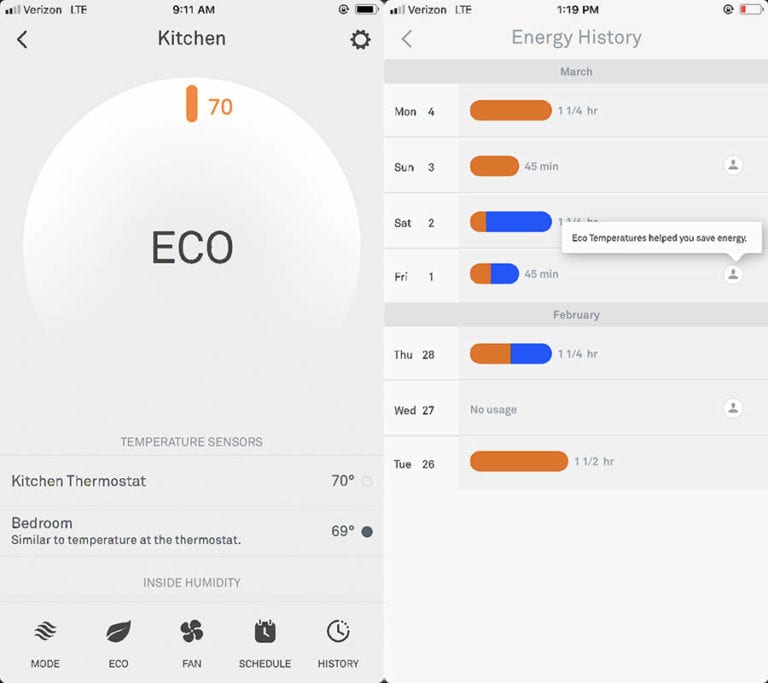
Controlling your thermostat matters! By utilizing a high tech device like “Nest” thermostat or other similar brand, you can remotely control your home’s heat setting. If you aren’t in residence full time, an investment in this type of technology will give you control of your home’s thermostat conveniently on your smart device. This is especially helpful for those who have their homes in a rental program. You can control the heat setting when the home is vacant or occupied. Make sure your renters understand all of your propane appliances so they are using them efficiently.
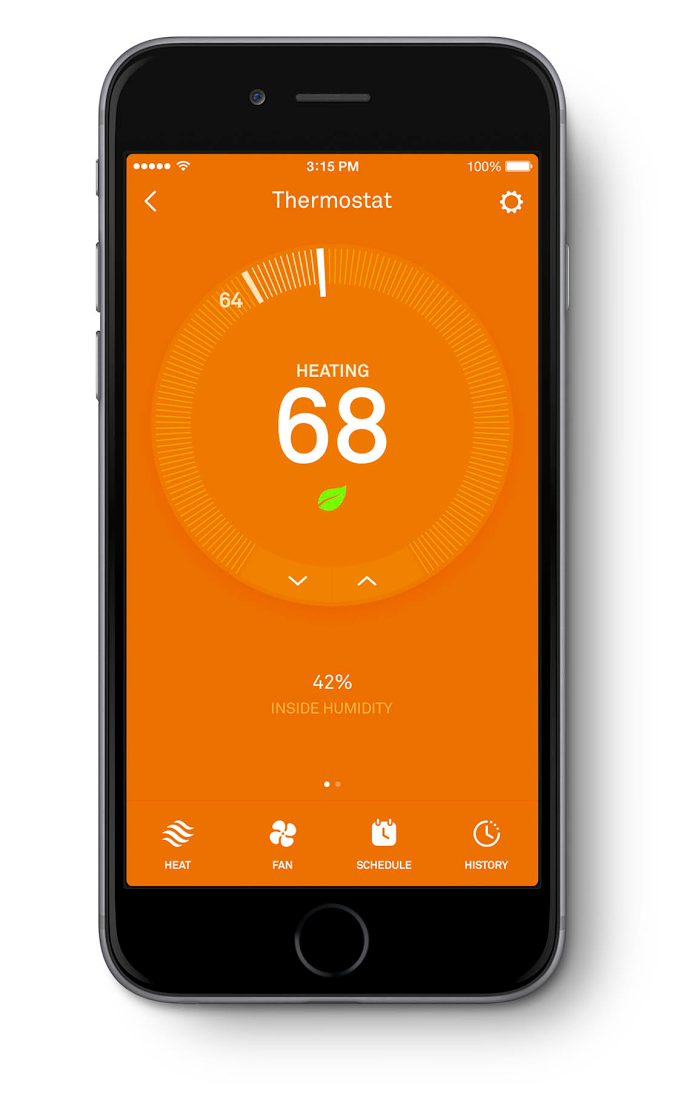
Seasonal residents are spending winter here than in their regular snowbird nests. Our customers that haven’t wintered with us in past years are utilizing more heat resources, therefore increasing their consumption because they are more acclimated to warmer climates during the winter months. Also, if your home was built originally as a summer home, check the insulation in the walls, ceiling and floors. Some homes are not built with as much insulation because their original intentions were not to have anyone in residence during cold months. Ensure all crawl space access points (doors, vents, etc) are closed during cold weather, and that all outside water spigots have been winterized.
Make sure all insulation in your home is airtight. Ensure windows and doors are all closed properly and weather stripping is installed where needed to prevent cold air from coming in. Consider installing draft stoppers at the bottom of outside doors. Another great consideration are thermal curtains or thermal blinds on large windows.
If you have questions about your consumption, set up your account to be viewed online at this website. By clicking “Pay My Bill” you can access your account and look at all of your history since the inception of your account with Blue Ridge Propane. We appreciate your business, and are always here to help!
Receiving Propane Deliveries in Bad Weather - Click to read more..
2021-01-15
Most customers start thinking about home heating is when the weather gets cold, or when snowflakes start falling. Here at Blue Ridge Propane, we run a route system, and are in certain parts of the county during certain weeks of the month. We have your propane tank sized to the BTU of each propane appliance in your home, so we know that your tank of propane will last until the next time we are in your area. Just because it is snowing doesn’t mean you need a delivery. Most neighborhoods do a good job keeping roads clear, however, it is your responsibility to keep your driveway clear so that a propane truck can get to your tank. If you live in a steep place, or one that is prone to not melt quickly after snowstorms, we are aware of your situation. We try to deliver when roads are most passable as to not cause damage to personal property, or put our drivers in danger. Please keep in mind when you call to request a delivery, that you need to let the customer service representative know what your road conditions are. Please remember to be courteous when making your request, as we usually deal with very high call volume during cold and snowy weather. We appreciate your business!
Tankless Water Heaters vs. Traditional Standard Tank Water Heaters - Click to read more..
2020-11-13
Homeowners, now more than ever, are trying to make their homes more energy efficient in every possible way. From better insulation, to specially coated windows, to different materials for siding. Whether you live in a hot or a cold climate, home maintenance is a very important part of protecting your investment. Another way that homeowners are utilizing their resources more efficiently is to upgrade to newer appliances that utilize less electricity or other fuel source.
In the propane industry, one of the most popular modifications we see homeowners wanting to make is from a traditional standard tank style water heater to a tankless model. Not only do they take up less space than traditional models, they conserve water and resources in a different manner.
On Demand Capability – Tankless water heaters heat up water as it is needed. Whenever a faucet is turned to hot, that is when the tankless starts heating the water. This utilizes less propane because you aren’t paying to heat a whole tank of water all the time as in standard tank models. With standard tanks, there is a risk of running out of hot water, then you have to wait for the tank to refill and become heated again. With a tankless unit, they will run hot water continuously.
More Efficient Use of Energy – A tankless unit isn’t switching on and off continuously to heat a large tank of water. It is only used when the faucet calls for water. As long as the faucet is off, the unit isn’t utilizing any energy.
Long Term Investment – Although tankless units are generally more expensive to purchase, they last longer and provide more long-term savings over their life time than a standard tank.
Maintenance – Most tankless units have longer warranties, meaning the company that makes them knows they will last longer. Blue Ridge Propane recommends having them serviced every other year and flushed with a special solvent; and having the filters cleaned. Any sediment buildup can be cleaned from the unit, whereas in a standard tank, the sediment just keeps building up. The older style units only have a life expectancy of 10-12 years. A tankless with proper maintenance can last up to 20 years.
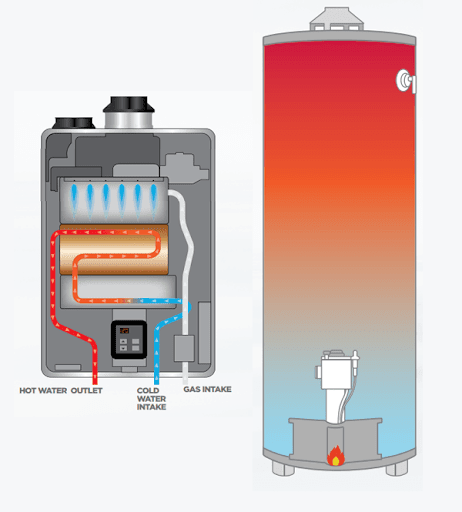
Don’t wait until you start experiencing problems with your current water heater to have Blue Ridge Propane give you an estimate for a replacement or upgrade to a tankless model. We have technicians that can come to your home and recommend the correct size for your particular needs.
Firelogs - To Vent or Not to Vent..... That is the Question - Click to read more..
2020-11-03
Vented Firelogs
Chimney Damper MUST be opened
Blue Ridge Propane installs a special clamp to ensure your damper stays open
Loss of approximately 85% of heat
Because the damper must stay open, heat from the logs as well as combustion escapes through the chimney vent
More Realistic Look
Flames can touch the logs on vented sets, therefore the look is more of traditional wood burning fires
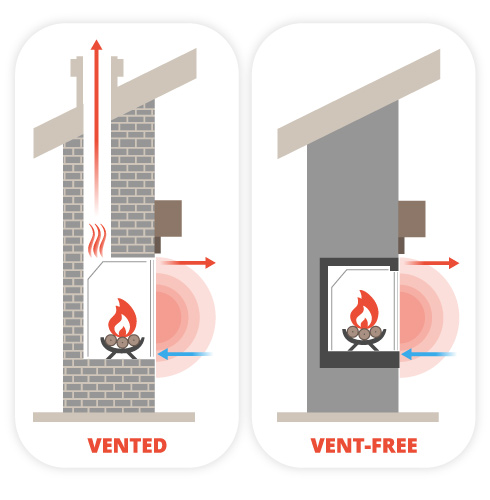
Vent-Free Firelogs
Best for heating –
The damper stays closed when utilizing vent free firelogs, therefore the heat stays in and doesn’t escape through the chimney vent
Chimney Preparation
It is encouraged for a chimney sweep to clean the chimney flue and install a cap on top of the chimney. This is to prevent any creosote or other debris from heating up and falling on the logs, damaging the logs or the burner. The cap will prevent water from coming down the chimney and possibly causing water damage to the logs and/or burner.
Carbon Monoxide Detection
Anytime a propane vent free appliance is used in your living space, a carbon monoxide detector is recommended, which Blue Ridge Propane can install.
Cannot be utilized in a bedroom or any other space where people are going to sleep.
To see which option is best for your living space and your family, contact the professionals at Blue Ridge Propane. Visit our showroom in Newland or call our office at 828-733-3603 to explore the possibilities of firelogs for your home.
Customer Appreciation Winter Special - Click to read more..
2020-10-16
As a thank you to our customers, we would like to extend a limited time offer of $50 off any new appliance installation. Mention this blog post to receive your special pricing.
This limited event includes firelogs, heaters, and water heaters.
Propane Appliances – Is it time to Switch? - Click to read more..
2020-10-03
There are many propane appliances that can be utilized in your home. They are safe efficient ways to save on electricity, and some of the newer appliances that will run on propane may surprise you. In most cases, utilizing propane is less expensive than electricity or oil. The installation of propane appliances is generally less expensive initially as well as in the long run. Propane is also considered a “green fuel”, and is better for the environment that other fuel types.
The most common among these appliances that Blue Ridge Propane installs and services include:
Water Heaters
Tankless Water Heaters – We proudly carry Noritz and Rinnai units, exclusively. These units heat water only as you need it, thereby reducing energy costs significantly.
Standard Tank Water Heaters – These units can come in several sizes, the most prominent being 50 gallon and 75 gallon capacities.
Fireplaces
Gas Logs – Vented or Vent Free
Direct Vent Fireplaces
Ventless Fireplace Inserts
Firepits
For outdoor usage
Patio Heaters
Cooking Appliances – Very efficient with low propane consumption
Cooktop
Range (with electric or propane oven)
Outdoor Grills
Other appliances that we do not sell through our office, but can still connect and covert for LP usage are:
Propane Clothes Dryers
Furnace
Dual Fuel Heat PumpsPool Heaters
Some manufacturers now make refrigerators that run on propane gas. For ‘off the grid’ living, these appliances are ideal.
Let us help you determine what appliances in your home can be converted to propane and start saving today! Remember, we recommend having your appliances serviced each summer before bringing them into service when the weather starts to turn cooler; with water heaters requiring service every two years. Thank you for trusting Blue Ridge Propane to help you!
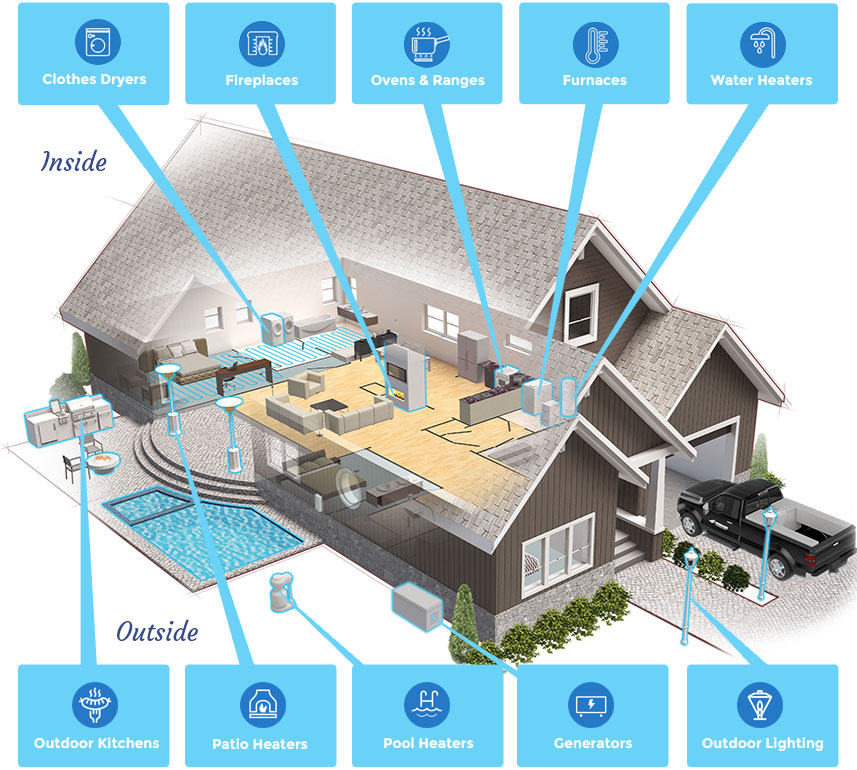
What is COLD? - Click to read more..
2020-09-10
Cold can be a relative term. The dictionary definition is as follows:
“Of or at a low or relatively low temperature, especially when compared with the human body”
We as humans are creatures of habit. When we are conditioned to one particular thing, it can be hard to make a change. A certainty that we must adapt to is the annual changing of seasons. Here in the beautiful Blue Ridge Mountains, we have four distinct seasons. Temperatures vary in each, but the one that catches our attention the quickest is when the weather goes from warmer to cooler. As we know, this isn’t an over night process, but a gradual cooling down similar to the days getting shorter. By gaining a minute at sunrise, and one at sunset, this time of year the days gradually get shorter. Just like the air temperature, it gradually gets cooler.
Because of our human nature, we don’t like change! Especially if it causes us any physical or mental discomfort. The change of seasons from warm to cool can get us out of our comfort zone. Because the word “COLD” is relative to the setting, it might seem cold at 70 degrees when we are used to temperatures of 85 degrees. When the outside night time temperatures get down to 55 degrees, it might seem COLD if we are used to 70 degrees. However, we all know that isn’t really cold, it is just a matter of what we as humans get conditioned to. COLD is different to each person.
Regardless of your definition of COLD, we begin our fall fill ups to propane tanks in the month of August each year. That way, when you feel it is COLD to you, you can turn on your propane appliances and enjoy WARM. Count on us for the remainder of the heating season to keep your home comfortable and your family happy.
Fall Fillup & Pre Season Checklist - Click to read more..
2020-08-21
During the month of August, our company shifts back into our regular delivery schedule with fall fill ups. Our weather here in the High County can be somewhat unpredictable between seasons. This time of year, the nights and mornings start getting a chill in the air, while the days remain warm. This is when most customers start utilizing their small propane appliances (gas logs, vent free heaters) to knock the chill off before utilizing their main source of heat when the weather gets cold and stays cold.
Several tips to ensure you and your home are ready for cold weather are listed below.
When beginning to utilize heat, make sure all windows and doors are closed, with no breeze or air coming in around the edges. Consider installing weather stripping or other insulation in gaps to prevent cold air entering the home.
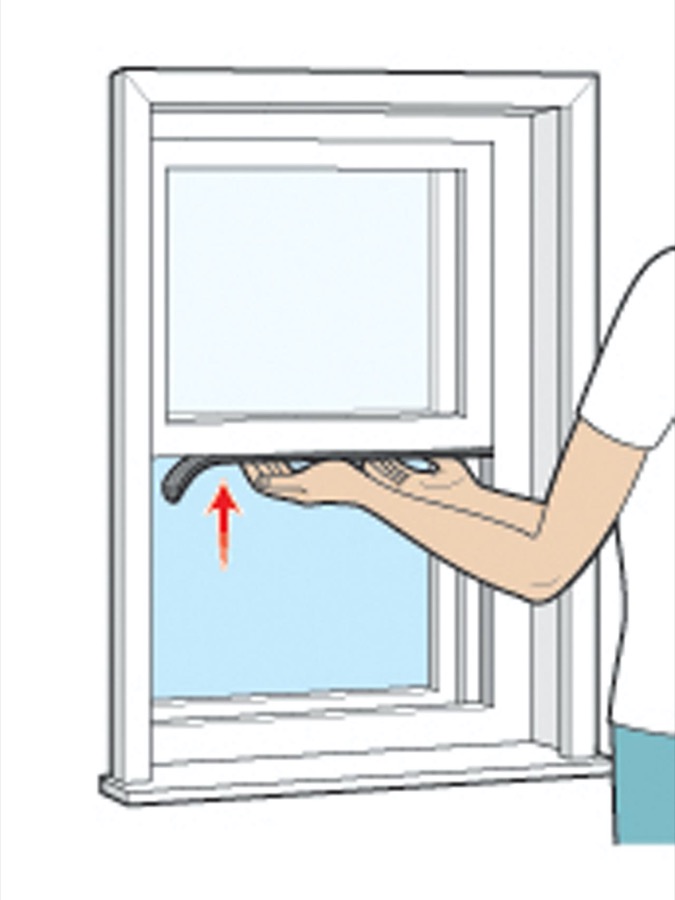
Make sure that proper insulation is installed in walls, ceiling and subfloor (basement/crawlspace). Some homes in the area were built for summer use only, and don’t have proper insulation for year-round use. If proper insulation isn’t in place, heat loss will become money wasting factor.
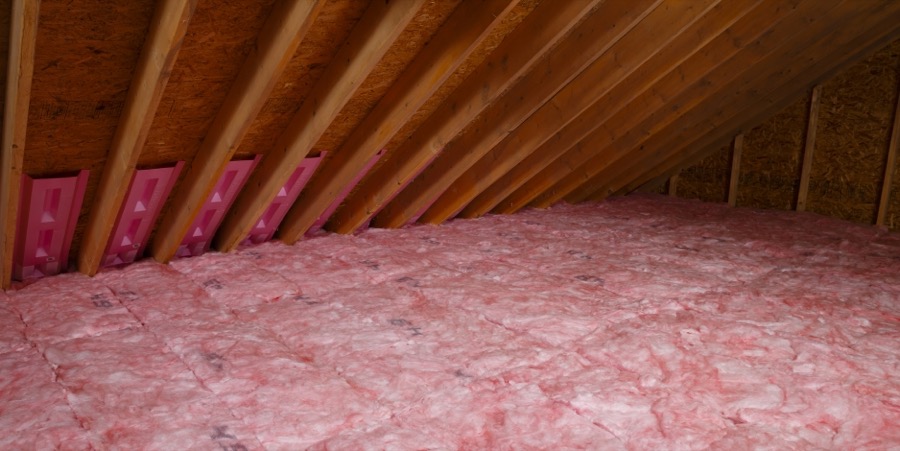
Turn water off water sources that are on the exterior of the home. This includes all spigots and outdoor faucets. Water hoses need to be disconnected and stored out of the weather. If a water hose remains connected, even if the water is off, water could freeze into the spigot and cause damage to water lines leading outside.
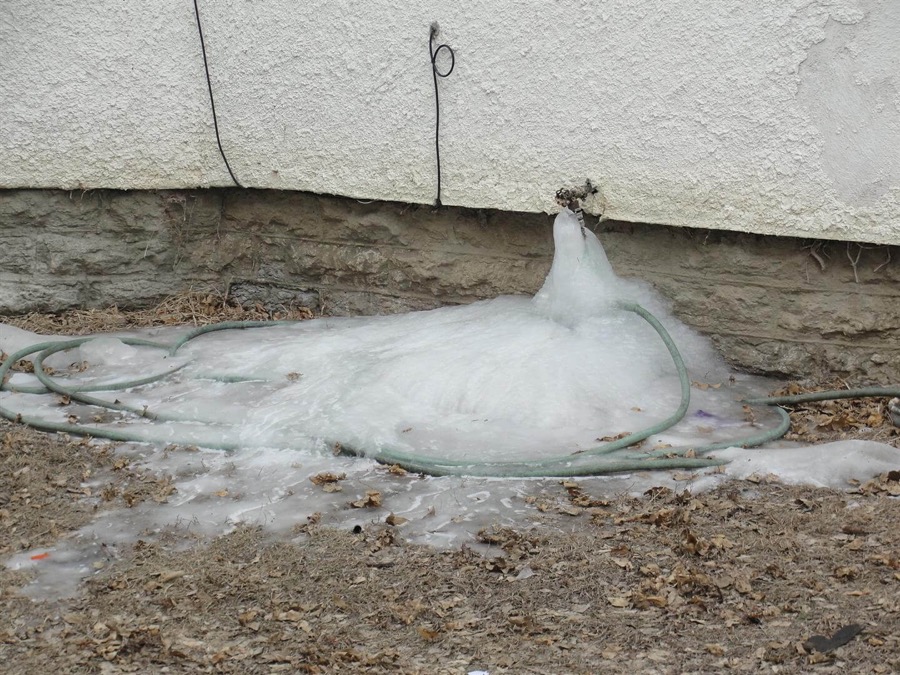
Have your furnace and other gas appliances serviced. This way you are ready for when cold weather returns, with assurance that your heats sources are in proper working order.
All heat ducts need to be free and clear of debris or any blockages. Furniture placement needs to be considered, not to block air flow.
For whole home units, change filters so air circulation is clean and unit isn’t working so hard to ‘breathe’.
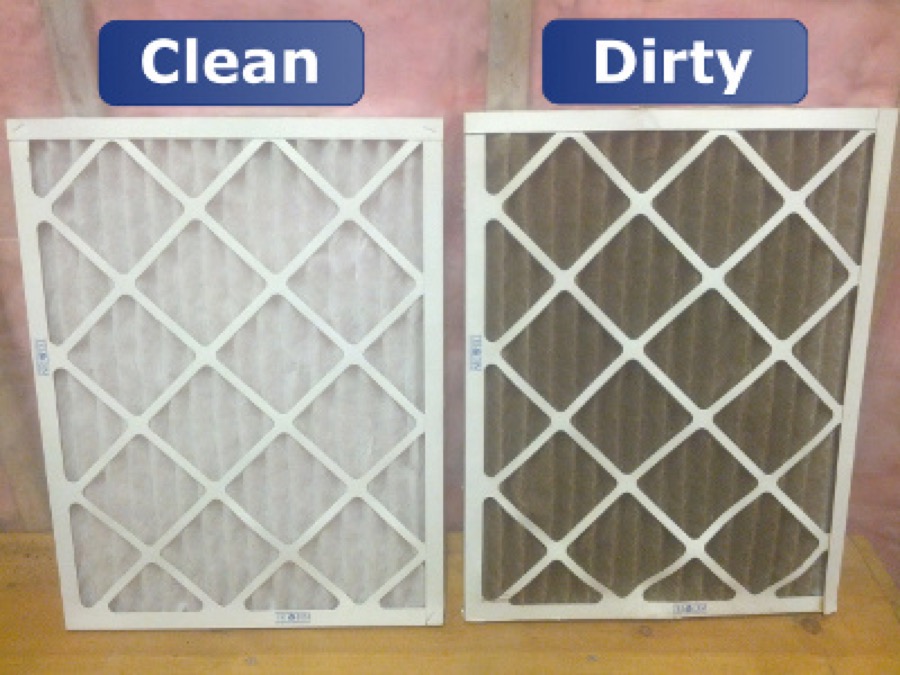
Set thermostat to a comfortable level, and remember, even when you aren’t home your heating unit is working to keep the temperature inside the house at the temperature the thermostat is set to.
If you have any questions about your heating efficiency, we are always glad to help evaluate your needs. Call our office at 828-733-3603 to arrange a visit from a service technician.
Safety First - Click to read more..
2020-07-31
Safety FIRST! As licensed professionals, our first priority is SAFETY! This means a full perspective of safety, first for our customers and also for our trained staff, technicians, delivery drivers and office staff. Safety is the forefront of our daily operation. We want our customers to know their propane is being delivered by employees who have monthly safety updates on their continual training, and have passed many tests for required certifications. They not only know how to handle the product and appliance that utilize propane, but also the equipment that delivers it. Our technicians and drivers wear protective equipment and understand the need for a constant eye on safety. Our trucks and employees are clearly marked so there is never a question who is on your property.
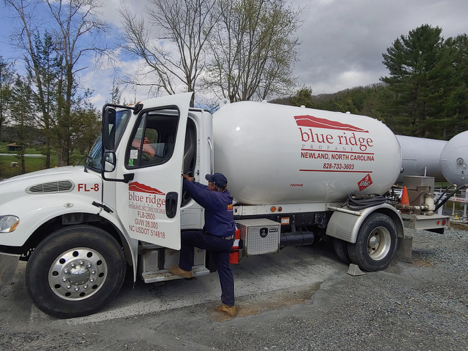
Roger Oberhelman Delivery Driver and Trainer for New Delivery Drivers of Blue Ridge Propane
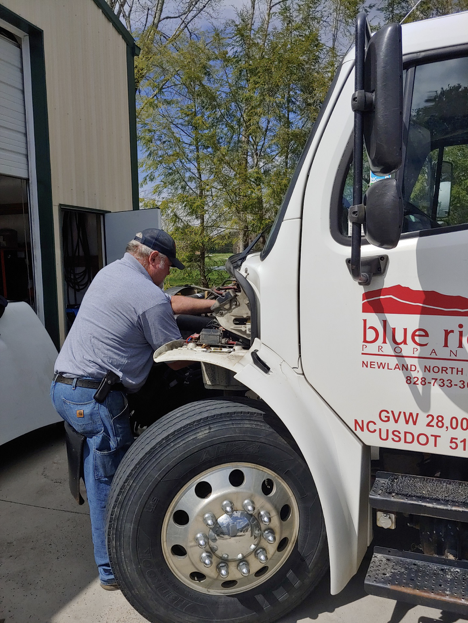
Tim McKinney, Maintenance Technician to keep our fleet up to date and safe
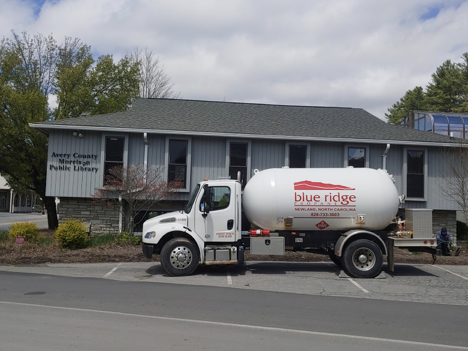
Safe delivery and parking in Newland by Mike Chester, Delivery Driver
Small Cylinder Safety - Click to read more..
2020-07-18
Long days and cool nights, summer has arrived in the High Country! We are all spending more time outside, which means enjoying some of our favorite pastimes: going for hikes, mowing the yard, grilling and sitting around the firepit. Some of these favorite activities have propane usage right at their very center, literally. Many grills, firepits and patio tables utilize a small 20# cylinder to fuel their fires. It is very important to treat these small cylinders with utmost care. Make sure they aren’t rusted, and if you obtained from an exchange station that has a plastic logo wrapping around the cylinder, take it off. Rain water and other moisture get between the label and the tank which can cause rusting and deterioration which makes the tank unsafe.
ALWAYS:
Utilize your small cylinder with appliance in a well vented area that is away from any combustible materials such as house, garage or deck.
Make sure tank is free of rust and other debris.
Check hose connections for splits or wear/tear in case it needs to be replaced.
Keep pets and small children away from small cylinders when in use with grills, firepits, and patio heaters.
When finished grilling, make sure all grill knobs are turned to OFF position, and propane cylinder valve has been turned to OFF position.
When transporting, make sure cylinders are in upright position (NEVER laying down) and secured with bungee cords or other tie downs.
NEVER:
DO NOT leave cylinders in hot cars or out in direct sunlight. The safety valve of the tank will engage and make the tank relieve propane vapor if the liquid propane gets too warm.
DO NOT attempt to move cylinder or appliance when flame is visible. Any hot surface will burn you and can result in serious injury or death.
DO NOT store cylinders indoors or in any enclosed area, in case of safety valve venting
DO NOT leave any grill, firepit or patio heater unattended.
DO NOT use electric tools or smoke while transporting small cylinders .
We can fill your small cylinders on our regular route if you will leave them beside your big residential tank. Our driver will make sure they are certified and fillable, then leave for you to put back in place.
Grateful for Our Customers - Click to read more..
2020-06-18
We are looking forward to another successful summer season at Blue Ridge Propane. Most of our seasonal residents have trickled back into the area after weeks of quarantine. It is good to hear from our customers that are only here part of the season, and we are glad to be serving their needs in addition to our local residents that we have the pleasure of serving year-round. Our business has been in operation since 1992, started by Jack Howard. Today, Blue Ridge Propane is still a family owned business, managed by Jack’s oldest son Patrick Howard. We take pride in knowing our customer base on a first name basis, whom we have served since the beginning. Our superb customer service combined with the skills of a professionally trained service team and driver fleet make us proud to serve all of our customers during every season.
The Avery-Journal Times is hosting their annual survey for Avery County’s Best of the Best. If you have experienced our great service and would like to take a moment and Vote for Blue Ridge Propane, Inc. as the BEST PROPANE PROVIDER in Avery County we would be grateful for your vote here https://survey.zohopublic.com/zs/iGCszn
Another category that we take pride in as part of our business services is Appliance Repair. Our area of expertise covers most propane appliances. (Propane Firelogs, Propane Heaters, Propane Water Heaters (Standard Tank & Tankless Models, Outdoor Firepits, Firestarters (indoor & outdoor), Driveway Torches).
Thank you in advance for your vote of confidence! If there is anything that we can do for you don’t hesitate to email us at blueridgepropanenc.net or call during regular business hours Monday – Friday, 7:30 am – 4:00 pm EST.
Propane Tank Options - Click to read more..
2020-06-01
Whether you are remodeling a home or starting from scratch, making sure that you have the correct size of propane tank for your needs is a very important decision. Our team at Blue Ridge Propane can help guide you to the correct size to fit your needs. We look at several factors: the size of your home, the main heating source, the BTU of each appliance that uses propane, whether you are a permanent or seasonal resident, how far from the main road your home is located.
Propane tanks comes in a variety of sizes and can be above ground or below ground. Only tanks that are 120 gallons or more can be buried according to North Carolina LP Gas Code. Standard residential sizes for customers who utilize propane as their main source to heat the whole home (i.e. propane fueled furnace, or heat pump with propane backup) are a 330 gallon tank, 500 gallon tank or 1000 gallon tank. 99% of customers lease their tanks from their propane provider instead of purchasing the tank. In the state of North Carolina, if one company owns your tank this means it cannot be filled by another propane company. At Blue Ridge Propane, when you become a customer, part of your customer profile is to sign a lease agreement for the tank located on your property. It states the size of your tank, and also the minimum annual requirement for dollars of propane usage for your particular sized tank.
Other sizes of propane tanks that we service are 200# and 420# Cylinders, which hold 45 gallons and 100 gallons of propane, respectively. These smaller tanks are used for applications that do not utilize as much propane for appliances as the larger tanks. They are used for water heaters, gas logs and small heaters. These tanks also have an annual minimum usage that must be met each heating season, which runs from June 1st through the following May 31st.
As a full service propane company, we will deliver your tank and keep it full for you. We have equipment available to bury the tank, or keep it above ground depending on your unique situation. During the winter months, we deliver on a monthly rotation, then not as often in the summer. We prefer for our clients to be on a “keep full” basis, so that we can maintain our route schedule and service their tank as we are in the neighborhood. Alternatively, your account can be on “will call”, meaning you can call us when you feel like you are ready for a delivery, and your tank is below 20%. However, this is not our preferred mode of operation, because a customer may let themselves run out and additional fees are incurred. Also, we may not have a truck close-by, and an out of route delivery fee would be incurred.
Let us know how we can help you choose the correct size tank for your propane needs. We are always available to help, and look forward to hearing from you!
Reopening of the Showroom - Click to read more..
2020-05-09
The state of North Carolina is entering Phase 1 of reopening business due to the COVID-19 restrictions, allowing more businesses to reopen.
Blue Ridge Propane is designated as an essential business (allowed to remain open to serve you), however, we took the extra precaution of closing our front doors to the public in March, while remaining fully staffed to support you by telephone, online, and email.
Thank you for your patience and understanding as we took these unprecedented actions to help keep you, our employees, our families and communities safe. In line with emerging state and local guidance and to serve you better, we are beginning to reopen our front doors to customers, beginning Monday May 11, 2020. We remain fully staffed take calls and online orders for propane deliveries and field service work. From the beginning of this coronavirus crisis, the health and safety of our employees and customers has been our primary concern, and this will remain so as we reopen our front doors. As we do this, please help us continue to serve you safely by doing the following:
If you don’t feel well, instead of visiting our location, please call us at 828-733-3603 or go online to www.blueridgepropanenc.net and we will take care of you safely.
To minimize exposure to you and our employees, please only access our facility through the front door. This is important to help contain exposure.
Wear a mask when entering our facility if you have been in any other county or state in the last two weeks. We will be strictly enforcing the wearing of masks for our customers.
Keep a safe distance of six feet from others.
Use hand sanitizer located conveniently at our front door in a touchless dispenser to reduce surface spread of the virus.
Blue Ridge Propane office staff will continue to clean and disinfect surfaces frequently (including equipment), to maintain and reinforce safe distances, to self-quarantine at the first sign of COVID-19 symptoms or confirmed exposure, as well as other precautions to reduce everyone's risk. If a confirmed case does impact one of our employees, we have detailed procedures in place to sanitize per health department guidelines and return to serving you promptly.
Regardless of what comes next with this pandemic, we remain committed to your safety and success. Together, we can get our critical work done while keeping our teams, families, and communities safe.
Propan Pricing and Account Options - Click to read more..
2020-04-28
Propane is a price-based commodity. There’s no question more tempting to ask over the phone with a prospective propane provider than “what’s your price?” Basing your decision to do business with any propane company solely based on price per gallon can be very misleading. At Blue Ridge Propane, our pricing depends on your annual gallon usage for the propane appliances you have at work in your home, which is determined when you first become a customer. Since propane is a price-based commodity, pricing can fluctuate depending on the season due to supply and demand. Most of the time these changes are cents on the dollar. Be cautionary of companies that try to gain business solely based on price per gallon, you might find yourself signed on with a cheap, low-quality propane gas company. We pride ourselves in not only fair pricing, but timely deliveries, professionally trained service technicians and great customer service
For customer who are interested in different pricing options, we offer the following (qualification based on individual customer history)
Even Monthly Budget Payments – Our Budget Program spans a 10-month time period beginning in August and runs through May during the peak of heating season. Customers will pay the same amount each month for your propane bill. In May, if customers still owe a balance on their account, we ask that they ‘settle up’ in this month. Budget plans cannot be started during the middle of the heating season, but must begin before heating season begins. Call our office for details so that we can customize your budget plan specific for your average usage.
Pre-buy Program – Avoid price spikes by buying propane in advance. This price for pre-buy is set in August, and is available for purchase from August 1 through September 15th, before the beginning of heating season. The minimum ‘buy-in’ for this program is 500 gallons per heating season. If you do not utilize this much propane each heating season, this program is not for you. If the pre-buy gallons aren’t utilized, they are lost and do not go back on the customer’s account as a credit. We help you determine based on past usage how many gallons should be purchased when buying in to the pre-buy program.
Automatic Payments – Schedule automatic monthly payments at convenient times with a payment method of your choice. We accept all major credit cards, and can also set up a bank draft for your billing. We encourage all of our customers in the Budget Plan to set up automatic payments on the 1st of each month. We can also set up your card to pay for each delivery, at the time of delivery. We try to make our process as easy and convenient for customers, to reflect our way of business.
Call our office to see if one of these programs will be beneficial to you!
“Flattening the Curve” on Coronavirus - Click to read more..
2020-04-15
As an essential service provider in our area, our primary concern is safety of our employees and customers. As of April 14, 2020 we are still running propane deliveries, and limited service work. Our county government has issued an Ordinance that we have worked into our Policies and Procedures at Blue Ridge Propane. The Ordinance can be viewed HERE.
In adaption to our operations, this means that if a customer calls in for service work at a home that isn’t their primary residence, we will be waiting until the customer has completed their period of quarantine before entering the home. If you are a seasonal resident, and have just gotten to your secondary residence in Avery County, you must “self-quarantine for a period of 14 days, or 7 days after symptoms have resolved, whichever time period is longer”. Unless the situation is considered an emergency (which will be determined at a managerial level within Blue Ridge Propane) then all service calls will be scheduled for 14 days after the initial request was made with our office. We must maintain high standards of integrity since our service technicians are in contact with many customers on a daily basis. It is our responsibility to our local community to be diligent in doing our part to keep the virus contained as much as possible.
As a provider of essential services, we deem the following items to be reason for a service technician to enter your residence.
Smell of propane
Propane Water Heater Not Functioning
Main Heat Source not functioning (furnaces and heat pumps require calling a heating/air vendor which we can recommend)
Non-essential items during this time are considered as follows and will be evaluated on a case by case basis
Gas Logs won’t lite (if you have another primary heat in residence)
Sales Calls for installation of new appliances
Our showroom and lobby remains CLOSED to customers. We are still answering phones, taking payments and scheduling deliveries. However, customers are not permitted inside our buildings at this time. We appreciate your understanding, and look forward to serving you in person again soon.
I bought a house with Propane. Now what? - Click to read more..
2020-04-01
New Homeowner Proper Propane Practice
After purchasing a home in our beautiful High Country, it is good to take an inventory of all of your utilities, especially your propane service. Most propane tanks are most often leased from the company that provides propane for the home. In the state of North Carolina, this means that the owner of the tank is the only company that can provide propane for that tank. When you purchase your home, ask your realtor who the current propane provider is. Another way to find the owner of your tank is to locate your tank then lift the dome lid on top of the tank, and typically a sticker with the propane company’s name is located there.
Just like electricity, you must call your propane provider to have service switched in to your name after purchasing a new home. At Blue Ridge Propane is it as simple as calling our office at 828-733-3603 and letting us know you have purchased a home that has existing propane service. We collect your contact information and send out safety information to your permanent mailing address. We also email (or mail, depending on your preference) a lease agreement for the tank. The ownership of the tank will remain with Blue Ridge Propane. There are a few limited cases where the customer has purchased the tank, and in that case, the tank goes with the real property that was purchased.
After the account has been transferred, we can schedule a delivery or even a service call to familiarize you with your propane appliances. Our main goal at Blue Ridge Propane is safety, and making sure our customers know how to utilize their propane appliances in an efficient, knowledgeable manner is a priority.
If you wish to switch from your current provider to Blue Ridge Propane, at the time your purchase a home is a perfect time to switch. Call our office so that we can schedule a service technician to come to your home and assess what your needs are. For small tanks, and above ground tanks, we would disconnect the current service providers tank and reset a tank belonging to Blue Ridge Propane. For underground tanks, call our office for more details.
We look forward to working with you to provide excellent service and timely deliveries that you can count on for many years to come.
Further Response: Showroom & Lobby Closed - Click to read more..
2020-03-20
Due to the recent developments surround COVID-19, our lobby and showroom will be CLOSED to incoming traffic until further notice.
You can still call 828-733-3603 between the hours of 7:30 am & 4:00 pm to request service, make payments, etc. We appreciate your understanding during this uncertain time, and appreciate your cooperation.
Blue Ridge Propane Management & Staff
COVID-19 Risk Assessment and Planning - Click to read more..
2020-03-17
Our number one concern here at Blue Ridge Propane is the safety of our customers, not only with respect to proper propane usage but also physical health as well. At this time, we encourage all customers to please call our office during regular business hours instead of visiting us in person with any questions at 828-733-3603, Monday through Friday, from 7:30 am to 4:00 pm.
What we are doing as a response to COVID-19:
All propane delivery routes are uninterrupted, and supply chain remains uninterrupted. We will be checking tanks on a monthly basis continuing through warmer months.
All service calls are being scheduled, after assessing customer needs. Service technicians sanitize hands before coming into your home, but you MUST tell us if you are having symptoms of any kind so that we can prioritize your needs.
Office personnel remain on hand to answer questions, take phone calls, help customers make payments, or other general inquiries
LIMIT CONTACT and practice social distancing at this time as recommended by local authorities. Only come by our office if you must make a CASH payment. We are keeping our office cleaned, sanitized and following all other guidelines as recommended by the CDC (Centers for Disease Control).
Visit us online for payment options at Blue Ridge Propane Bill Pay
IF any of these terms change we will notify our customers via our website, and social media, and stay in accordance with guidelines issued by governing authorities. We appreciate your business, and actively encourage everyone to stay safe during this time.
Propane Appliance sale - Click to read more..
2020-03-13
When planning your renovations, consider adding propane appliances to the list of “Must Haves”. With a built-in supply of fuel on your property, the options are endless for what appliances you can integrate into your home utilizing propane. At Blue Ridge Propane, we can help you decide what type of heat source is best for your home. We work with builders to determine what will be the most efficient way to heat a new or remodeled home.
Not only is propane a safe and efficient fuel, but in many applications, it is less expensive to operate than electric units. Propane generates more BTU’s that an equivalent amount of electricity. Therefore, you need less propane to generate the same amount of heat energy. Propane units are clean burning and waste very little fuel in the combustion process. This makes propane better for the environment, and is considered a ‘green fuel’.
Another primary source for energy savings are tankless water heaters. We carry two of the industry leading brands; Noritz and Rinnai. We can size your home for the correct unit, as well as service the unit in the years to come. Propane water heaters overall last longer than electric models, produce hot water faster, and generally need less space to operate. Our recommendation is that all tankless water heater units have a service call every two years, to rinse any calcium deposits from the cabinet and lines. This is something our licensed service professionals can complete for you at your convenience.
One of our most popular propane applications in the High Country are propane fireplaces and gas logs. The provide a great supplemental heat to any home, while retaining a cozy atmosphere. In our showroom, we have on display both vented and unvented versions of gas logs, as well as fireplace inserts. Other popular supplemental heat sources are unvented wall heaters. We can install and service all of these types of products. If you have an old wood fireplace, and would like to convert to a safe, and cleaning burning propane fireplace, we are able to handle your project, no matter big or small. These units are not only efficient, but easy to use; most utilizing an on/off remote or thermostat. The flames are realistic, without all the mess to clean up.
Although we don’t sell the following units, we do provide service for a host of other propane appliances.
Propane Dryers
Propane Range / Cooktop / Oven
Commercial Fryer / Range
Outdoor Grills (Limited High End Selection)
Keep Pathways Clear of Debris - Click to read more..
2020-03-05
Your local professionals at Blue Ridge Propane brave all types of weather to make sure you have propane in your tank, to maintain a safe and efficient use of all of your propane appliances. This means rain, snow, sleet or shine, cold or warm weather, our delivery drivers are making their rounds. To be sure we can always make a delivery, driveways need to be clear of overhanging trees, low hanging utility wires or any other obstacles that would inhibit a propane tank truck from coming onto your property safely. Trim hedges, bushes, and trees frequently to prevent overhangs. As a courtesy, when planning your landscaping keep in mind that a clear path needs to be maintained to your propane tank at all times of the year. This means any tree limbs, trash or other debris needs to be kept off of or away from the tank. Decorative additions that may hide a tank, including lattice work or fencing needs to be maintained as to not block entrance to the service valves located on the tank. Also, fencing around a tank should be easily accessible. Drivers have to pull the delivery hose from where the truck is parked to your tank. The hose doesn’t need to be dragged over anything that would inhibit easy movement, or snag the hose in any way. We also ask that before you fence in any area for pets, that your propane tank isn’t included in that enclosure, to prevent driver injury from territorial pets or their excrement.
What does propane smell like? - Click to read more..
2020-02-27
Propane in it’s natural state is odorless and tasteless. Odorant is added to propane that gives it the distinctive smell, very similar to rotten eggs or the spray of a skunk. This odorant is added so that propane is detectable in large or small quantities. Blue Ridge Propane sends out an annual mailing of brochures that have a scratch and sniff circle that smells like propane. It is good that everyone in your family knows this distinctive smell so that action can be taken.
Customers sometimes report a gas smell when using their vent free heaters or gas logs. There are several precautions that customers can take to prevent any strong odor when operating their propane units.
DO NOT USE any petroleum- based product where you are utilizing a vent free heater or vent free gas logs. The small petroleum molecules in the air get pulled into the unit, along with the oxygen. Then, as the unit is operating those small molecules get ‘burned’ in the air, causing a strong foul odor. This includes but is not limited to:
a: Painting or Staining
b: Using air fresheners, especially wall units that emit air freshener over a long period of time.
c: Scented Candels
d: Storage of household cleaners
Keep units clean and free of debris to ensure proper combustion. We recommend all vent free units be serviced on an annual basis. Do not have any other objects within 36 inches of any vent free propane unit.
Vents and Exhausts need to be clear at all times. Make sure that critters don’t get into the venting for your chimney, water heater, or any other orifice where your propane appliance “breathes”. By having a blockage at one of these outlets, it is possible for a propane smell to build up.
Follow these important steps if you smell gas:
Extinguish FLAMES or SPARKS. Immediately put out any open flames, put out smoking materials, and do not use any electronic equipment where a gas smell has been detected. This includes turning on light switches, or any other spark that can be an ignition source.
Leave the area. Get everyone out of the building where or area where gas smell has been detected.
Shut off the Propane. If it is safe to do so, turn the valve on your tank CLOCKWISE (to the right) to shut off the gas supply from the tank.
Report the Leak. After leaving the premises, contact Blue Ridge Propane at 828-733-3603 to report the smell. We always have someone on call 24 hours a day, 7 days a week that can investigate.
Do Not Return to Building or Area. Until a certified technician checks the area, or emergency responder checks the area, do not reenter until you have been told it is safe to do so.
Schedule a System Check. In most cases, we will automatically perform a leak check of your system if you suspect you smell propane. This ensures that all appliances have been brought back into service in a safe manner, with no leaks.
Importance of Thermostats - Click to read more..
2020-02-17
Modern homeowners enjoy many conveniences not available until the past few decades. Many we take for granted that our ancestors would have never thought possible; indoor plumbing, refrigeration, and heating/cooling to name a few. We no longer have to worry about maintaining heat all night long by burning wood in a stove or fireplace. We can simply utilize our thermostat to maintain a pleasant temperature both day and night. Regardless of the outside temperature, a thermostat will maintain an indoor temperature to the setting of your choice. This marvel of technology also keeps your home at that same temperature setting whether you are home or not. Thermostat and propane usage have a direct correlation to several different variables. The first is the outside temperature, and what your inside thermostat is set to. For example, if your thermostat for your heating system is set to 68 degrees, and the outside temperature is 30 degrees, then your system is going to run until the inside temperature reaches 68 degrees. When the temperature drops inside, the system will again turn on in an effort to maintain the temperature set on the thermostat. Another factor in propane usage in conjunction with the thermostat is the square footage of the structure that is being heated. If your home has a large square footage, and the thermostat is set to a higher temperature, then propane usage will be more. In our climate in the North Carolina mountains, weather patterns can change drastically within just a few days (or hours) time. Propane usage can vary in changing weather patterns. This is why Blue Ridge Propane prefers to put all of our customers on our regular route, so that their tanks can be monitored on a monthly basis, and filled as needed, regardless of changes in the weather. Be a smart and efficient homeowner, and manage your thermostat temperature.
Leave it to the Experts - Click to read more..
2020-02-05
Are you considering a renovation or other project for your home this spring? An additional room, enclosed porch, update to the kitchen cabinets, new septic tank? Before beginning ANY project, be sure to check with Blue Ridge Propane to identify where your lines are located, both inside and outside of your home. The prevention of lines being damaged inside or outside is definitely worth the time to have our service technicians mark lines for you. When planning these projects, it is prudent to call ahead before the day you are in need of service, so that we have time to put you on our schedule. Typically, a week advance notice for marking lines is sufficient for scheduling. Thank you for keeping your home and your neighborhood safe!
